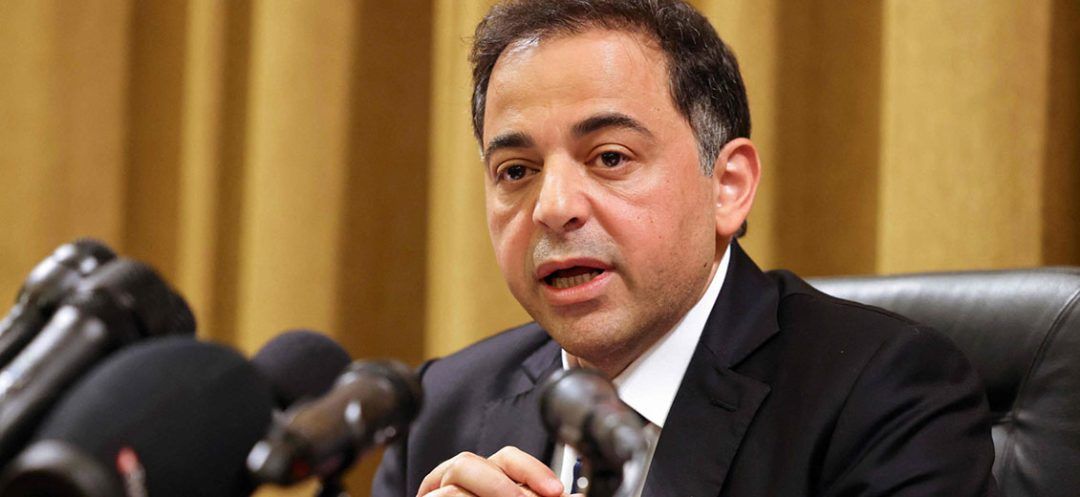
The interim governor of the Central Bank of Lebanon (BDL), Wassim Mansouri, disclosed that the bank is studying a new proposal regarding the categorization of the depositors’ funds, which have been frozen since the onset of the 2019 rampant economic crisis. He estimated the banks' liabilities at nearly $88 billion.
In an interview with Al-Sharq newspaper on the sidelines of the World Bank (WB) and International Monetary Fund (IMF) Spring Meetings, BDL's Interim Governor, Wassim Mansouri, revealed that he instructed the BDL's statistics department to analyze depositors' funds for improved distribution based on the individuals’ profiles.
In this context, he pointed out as an example that "one category of depositors will be considered as investors, with their funds returned based on financial methods they understand and agree to."
In response to a question, BDL's interim governor stated that the current economic conditions and security situation in southern Lebanon do not allow for expanding the pool of beneficiaries for fresh dollar withdrawals or increasing withdrawal limits. "However, this could change depending on evolving circumstances," he added. He further explained that resolving the issue of bank deposits depends on the definite implementation of a four-point plan.
This initial step entails determining responsibilities under "sole Lebanese jurisdiction," followed by devising a plan for the restitution of bank deposits, then rebuilding the banking sector so that its role in granting credit is minimal, and finally restructuring the public sector. "The country had no other options but to implement all these factors," as stated by Mansouri.
He further suggested that "establishing a balance between a dollarized economy and one based on the Lebanese pound has brought about monetary stability, which, however, is not enough for economic development." He referred to the control mechanism put forward by the BDL over the money supply in Lebanese pounds and the injection of dollars exclusively through the state.
The efforts to develop the economy with available resources were underway, but were impeded by regional conditions, especially given the unpredictable nature of the situation," he explained.
Mansouri said that the developments in the geopolitical situation might push the government to seek financing sources to cover any additional expenses.
By the same token, he reiterated his refusal to finance additional government expenses. Furthermore, he highlighted that "the possibility for further public financing is limited, with half of the budget already allocated to salaries."
It should be mentioned that the state budget has decreased from $17 billion to $3.2 billion, while the GDP has dropped from nearly $55 billion to $20 billion.
In an interview with Al-Sharq newspaper on the sidelines of the World Bank (WB) and International Monetary Fund (IMF) Spring Meetings, BDL's Interim Governor, Wassim Mansouri, revealed that he instructed the BDL's statistics department to analyze depositors' funds for improved distribution based on the individuals’ profiles.
In this context, he pointed out as an example that "one category of depositors will be considered as investors, with their funds returned based on financial methods they understand and agree to."
In response to a question, BDL's interim governor stated that the current economic conditions and security situation in southern Lebanon do not allow for expanding the pool of beneficiaries for fresh dollar withdrawals or increasing withdrawal limits. "However, this could change depending on evolving circumstances," he added. He further explained that resolving the issue of bank deposits depends on the definite implementation of a four-point plan.
This initial step entails determining responsibilities under "sole Lebanese jurisdiction," followed by devising a plan for the restitution of bank deposits, then rebuilding the banking sector so that its role in granting credit is minimal, and finally restructuring the public sector. "The country had no other options but to implement all these factors," as stated by Mansouri.
He further suggested that "establishing a balance between a dollarized economy and one based on the Lebanese pound has brought about monetary stability, which, however, is not enough for economic development." He referred to the control mechanism put forward by the BDL over the money supply in Lebanese pounds and the injection of dollars exclusively through the state.
The efforts to develop the economy with available resources were underway, but were impeded by regional conditions, especially given the unpredictable nature of the situation," he explained.
Mansouri said that the developments in the geopolitical situation might push the government to seek financing sources to cover any additional expenses.
By the same token, he reiterated his refusal to finance additional government expenses. Furthermore, he highlighted that "the possibility for further public financing is limited, with half of the budget already allocated to salaries."
It should be mentioned that the state budget has decreased from $17 billion to $3.2 billion, while the GDP has dropped from nearly $55 billion to $20 billion.
Read more



Comments